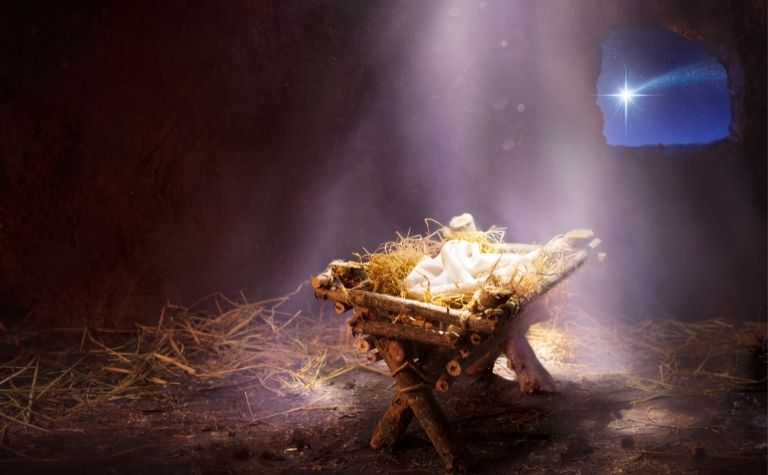O Come, All Ye Faithful is an Advent hymn full of praise, celebration, and joy. The hymn isn’t for somber reflection like O Come, O Come, Emmanuel, but for holy and energetic praise, not unlike Joy to the World!
The refrain boldly invites followers of Jesus Christ to “come, let us adore him.” The word “adore” means to love and respect. In relation to God, the refrain is a summons to worship the Savior of the world.
The themes of the hymn are the unity of God’s people as they worship and the incarnation of Jesus Christ who came to the world to seek and save the lost.
Jesus prayed that God’s sons and daughters would “be one, just as you, Father, are in me, and I in you” (John 17:21, ESV). What better time is there for the Church to demonstrate unity than at the celebration of the birth of its Savior?
Also see 151 Advent Hymns and Song for Christmas for more.

Lyrics to the Advent Hymn O Come, All Ye Faithful
The hymn opens by informing worshipers that a celebration is underway in Bethlehem. God hasn’t abandoned his people. The newborn baby is the fulfillment of God’s promise.
Though he is a baby, Jesus is King of Kings and Lord of Lords. He is God. He is light. He is worthy of praise and worship. The Word has become flesh (John 1:14) and in response, his children sing, “Jesus, to thee be all glory giv’n!”
| 1 O come, all ye faithful, joyful and triumphant! O come ye, O come ye to Bethlehem! Come and behold him, born the King of angels. |
| Refrain: O come, let us adore him, O come, let us adore him, O come, let us adore him, Christ the Lord! |
| 2 God from true God, and Light from Light eternal, born of a virgin, to earth he comes! Only-begotten Son of God the Father |
| 3 Sing, choirs of angels, sing in exultation, sing, all ye citizens of heav’n above! Glory to God, all glory in the highest |
| 4 Yea, Lord, we greet thee, born this happy morning; Jesus, to thee be all glory giv’n! Word of the Father, now in flesh appearing |
Charles Surgeon writes, “Immanuel, God with us. It is hell’s terror. Satan trembles at the sound of it… Let him come to you suddenly, and do you but whisper that word, God with us, back he falls, confounded and confused… God with us is the laborer’s strength.”
Spurgeon continues: “How could he preach the gospel, how could he bend his knees in prayer, how could the missionary go into foreign lands, how could the martyr stand at the stake, how could the confessor own his Master, how could men labor if that one word were taken away?”
“God with us is eternity’s sonnet, heaven’s hallelujah, the shout of the glorified, the song of the redeemed, the chorus of the angels, the everlasting oratorio of the great orchestra of the sky.”
Also see O Come O Come Emmanuel for more.

Story of O Come, All Ye Faithful
There is a sense of urgency to this hymn. Imagine a child, tugging at your hand, saying insistently, “Let’s go, let’s go, let’s go!” In the same way, imagine someone pulling at your sleeve or grasping you by the hand, half dragging you as they run through the crowd, saying over and over again, “Come!”
We are told that patience is a virtue, but in this case, impatience is a beautiful thing. For who could stand by and wait when all we want to do is worship our Lord and Savior?
Albert Bailey writes, “The poet takes us by the hand and leads us with triumphant song to the cave of the Nativity in Bethlehem, shows us the Babe, and bids us adore” (The Gospel in Hymns, 279).
This hymn invites us to sing with the angels, sing with our families, sing with our fellow believers, and with every fiber of our being, worship Christ the Lord. (From hymnary.org)
Also see Angels We Have Heard On High for more.

Advent: Meaning, Dates, and History
The word “Advent” comes from the Latin word Adventus, meaning a “coming” or “arrival.” It describes the ecclesiastical season immediately before Christmas.
In the Western world, Advent Sunday, i.e. the first day of Advent, is the Sunday nearest to Saint Andrew’s Day (i.e. Nov. 30). Four Sundays in Advent precede Christmas Day. In the East, Advent is longer, beginning in the middle of November.
Advent Sunday is traditionally the day on which the ecclesiastical year begins. The first clear references to the season in the West come from the latter half of the 6th century.
Advent is observed as a time or preparation for Christmas like Lent is for Easter.
Also see Joy to the World! for more.
Bible verses related to the hymn for Advent
- Matthew 1:23, Behold, the virgin shall conceive and bear a son, and they shall call his name Immanuel (which means, God with us).
- Luke 2:7, “And she gave birth to her firstborn son and wrapped him in swaddling cloths and laid him in a manger, because there was no place for them in the inn.”
- John 1:1, “In the beginning was the Word, and the Word was with God, and the Word was God.”
- John 1:14, “And the Word became flesh and dwelt among us, and we have seen his glory, glory as of the only Son from the Father, full of grace and truth.”
- Galatians 4:4, “But when the fullness of time had come, God sent forth his Son, born of woman, born under the law”
- Hebrews 2:9, “But we see him who for a little while was made lower than the angels, namely Jesus, crowned with glory and honor because of the suffering of death, so that by the grace of God he might taste death for everyone.”
- Hebrews 1:3, “He is the radiance of the glory of God and the exact imprint of his nature, and he upholds the universe by the word of his power. After making purification for sins, he sat down at the right hand of the Majesty on high”
Please see related articles below

Related Articles
Unlike the Advent hymn O Come, O Come, Emmanuel, which expresses hope and longing for the coming of the Messiah, Joy to the World! celebrates his arrival. A time of mourning (the cross) lies in the...
The Christmas season is full of festive music like the beloved Advent hymn, O Come, O Come, Emmanuel. Like the biblical stories that tell about the birth of Jesus Christ, the songs of Advent contain...
